
Algorithms
metrics 2024
Advancing the Frontiers of Computational Insight.
Introduction
Algorithms is a prestigious and innovative journal published by MDPI, focusing on the rapidly evolving fields of computational mathematics, numerical analysis, and theoretical computer science. Launched in 2008, this open access journal seeks to foster collaboration and knowledge sharing among researchers, professionals, and students by providing a platform for the dissemination of high-quality research articles, reviews, and notes. With its operational base in Basel, Switzerland, Algorithms has steadily established itself in the academic community, achieving commendable rankings such as Q2 in Computational Mathematics and Numerical Analysis, as well as Q3 in Computational Theory and Mathematics and Theoretical Computer Science as of 2023. Furthermore, the journal boasts impressive Scopus rankings, placing it within the top 20% in several categories, underscoring its relevance and influence in the field. As an open access journal, Algorithms ensures that its content is accessible to all, promoting the advancement of algorithmic research and fostering critical discussions that may shape the future of the discipline.
Metrics 2024
 -
- 1.80
1.80 1.90
1.90 -
-Metrics History
Rank 2024
IF (Web Of Science)
JCI (Web Of Science)
Quartile History
Similar Journals

Journal of Computational Geometry
Fostering Collaboration in Geometric ResearchThe Journal of Computational Geometry, published by the Carleton University Department of Mathematics & Statistics, is a premier open-access journal dedicated to advancing the field of computational geometry. With an ISSN of 1920-180X, this journal has been a vital resource since its inception, promoting robust research since 2010. Situated in Canada, it provides a platform for high-quality papers that explore algorithms and computational techniques related to geometric structures and their applications.
Though currently classified in Q3 category quartiles across several domains—including Computational Theory and Mathematics, Computer Science Applications, and Geometry and Topology—its commitment to fostering innovation and collaboration within the mathematical community makes it a noteworthy contender for academic contributions. Researchers, professionals, and students interested in the intersection of computational methodologies and geometric analysis can find valuable insights and emerging trends within its pages. As of 2023, the journal's Scopus rankings reflect a growing interest, providing fruitful avenues for interdisciplinary research opportunities and scholarly communication in this dynamic and evolving field.

Theoretical Computer Science
Exploring the Foundations of Algorithms and LogicTheoretical Computer Science, published by Elsevier, serves as a pivotal platform in the field of computational theory, exploring the foundational aspects of computer science and mathematical logic since its inception in 1975. With both a print ISSN of 0304-3975 and an E-ISSN of 1879-2294, this journal is esteemed for its rigorous peer-review process and commitment to advancing knowledge in theoretical frameworks and algorithms. Positioned in the Q2 quartile for both Computer Science (miscellaneous) and Theoretical Computer Science categories, it ranks #124 out of 232 in general computer science and #73 out of 130 in theoretical computer science according to Scopus metrics, reflecting its significant influence and reach within the academic community. Researchers and professionals can access this journal through institutional subscriptions, providing a plethora of high-quality articles that contribute to ongoing debates and developments in the discipline. The journal's scope encompasses a wide array of topics, ensuring relevance across various subfields, thus making it an essential resource for anyone dedicated to furthering their understanding of theoretical computer science.
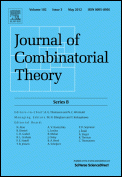
JOURNAL OF COMBINATORIAL THEORY SERIES B
Illuminating the Path of Theoretical AdvancementsJOURNAL OF COMBINATORIAL THEORY SERIES B, published by Academic Press Inc., Elsevier Science, is an esteemed journal within the discipline of combinatorial theory, discrete mathematics, and theoretical computer science. With a rich history since its inception in 1971 and ongoing publication through 2025, this journal has established itself as a pillar in its field, currently holding Q1 category rankings in multiple areas including Computational Theory and Mathematics, Discrete Mathematics and Combinatorics, and Theoretical Computer Science. The journal features cutting-edge research and developments, attracting contributions from both established professionals and emerging scholars. Despite the absence of an open access option, the journal's strong impact reflected in its Scopus ranks—such as being number 16 out of 92 in Discrete Mathematics and Combinatorics (83rd percentile)—signifies its influential role in advancing knowledge and innovation. Researchers seeking to share impactful findings and connect with a vibrant academic community will find the JOURNAL OF COMBINATORIAL THEORY SERIES B an essential resource.
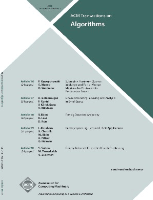
ACM Transactions on Algorithms
Advancing the Frontiers of Algorithmic KnowledgeACM Transactions on Algorithms (ISSN: 1549-6325, E-ISSN: 1549-6333) is an esteemed academic journal published by the Association for Computing Machinery (ACM), dedicated to advancing the field of algorithms within the broad domain of mathematics. With an impressive 2023 Quartile Ranking of Q1 in Mathematics (miscellaneous) and a Scopus rank placing it in the 15th percentile of its category, this journal is a pivotal resource for researchers, professionals, and students alike. Covering topics from algorithm design and analysis to applications in diverse areas, it serves as a platform for publishing high-quality, peer-reviewed research that significantly contributes to theoretical advancements and practical implementations. Although it is not an open-access journal, its impact in the academic community is profound, ensuring that vital findings reach a wide audience while promoting innovation and excellence in algorithm research. Established in 2005, with contributions continuing through 2024, ACM Transactions on Algorithms remains at the forefront of its field, underpinning significant developments and collaborations in algorithmic research.

Communications in Combinatorics and Optimization
Fostering Global Collaboration in Mathematical InnovationCommunications in Combinatorics and Optimization is a prestigious open-access journal published by Azerbaijan Shahid Madani University, focused on advancing research in the fields of combinatorial mathematics and optimization. Since its inception in 2016, the journal has established a reputation for disseminating high-quality research, achieving a commendable Q2 ranking in both Control and Optimization and Discrete Mathematics and Combinatorics as of 2023. With a Scopus ranking of #13 in Discrete Mathematics and Combinatorics, it is positioned in the top 14% of its field, underscoring its significance in the academic community. By providing unrestricted access to its articles, the journal promotes the widespread dissemination of knowledge, fostering collaboration and innovation among researchers, professionals, and students around the globe. Based in Iran, the journal continues to contribute to the global discourse on effective combinatorial and optimization techniques that address contemporary challenges.
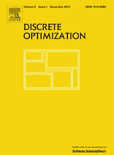
Discrete Optimization
Illuminating the Path of Discrete Optimization ResearchDiscrete Optimization is a leading academic journal published by Elsevier, focusing on the pivotal field of discrete optimization, which plays a crucial role in various domains including applied mathematics, computational theory, and theoretical computer science. With its ISSN 1572-5286 and E-ISSN 1873-636X, the journal offers a platform for researchers to disseminate their findings and contribute to the advancement of knowledge in discrete methodologies and algorithmic strategies. Discrete Optimization has demonstrated a steady path of progress, recognized in 2023 with a Q3 quartile ranking across applied mathematics, computational theory, and theoretical computer science categories, indicating it is a respected journal within these competitive fields. Although currently a subscription-based journal, it continues to inspire innovative research and offers valuable insights for researchers, professionals, and students alike. The journal serves as an essential resource for those seeking to deepen their understanding and application of optimization techniques, contributing to the ongoing evolution of the discipline.
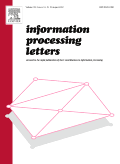
INFORMATION PROCESSING LETTERS
Empowering the Next Generation of Computational ThinkersINFORMATION PROCESSING LETTERS, published by ELSEVIER and with an ISSN of 0020-0190, is a prominent academic journal that serves as a vital resource in the fields of Computer Science, Information Systems, and Signal Processing, among others. As evidenced by its Q3 ranking across various categories in 2023, including Computer Science Applications and Theoretical Computer Science, it provides a rigorous platform for the dissemination of innovative research and theoretical developments. Researchers and professionals can delve into a wide array of subjects pertinent to information processing, contributing to advancements in technology and data management. Although it does not offer Open Access options, the journal maintains an influential presence in scholarly discourse, making it a crucial reference for those engaged in computational innovations and system optimizations. With coverage from 1971 to 2025, it continues to be integral for both seasoned academics and emerging scholars.

JOURNAL OF EXPERIMENTAL & THEORETICAL ARTIFICIAL INTELLIGENCE
Unveiling Insights into AI's Evolving LandscapeThe Journal of Experimental & Theoretical Artificial Intelligence, published by Taylor & Francis Ltd, serves as a premier platform for researchers and professionals interested in advancing the fields of artificial intelligence, software engineering, and theoretical computer science. Established in 1989, this peer-reviewed journal features original research and comprehensive reviews that explore innovative methodologies and emerging trends within these dynamic domains. With an impact factor that reflects its relevance, the journal currently ranks in Q3 across its categories, affirming its contributions to the scholarly community. The journal's commitment to quality and rigor invites submissions that bridge experimental and theoretical frameworks, thus fostering a deeper understanding of AI's applications and implications. Researchers and students can access insightful articles that drive critical discussions and inspire future work, making this journal an essential resource for anyone looking to delve into the complexities of artificial intelligence and its surrounding disciplines.

International Journal of Computer Mathematics- Computer Systems Theory
Transforming Ideas into Mathematical SolutionsInternational Journal of Computer Mathematics - Computer Systems Theory, published by Taylor & Francis Ltd, is a vital resource in the fields of computational mathematics and computer systems theory. With an ISSN of 2379-9927 and E-ISSN 2379-9935, this journal has established a prominent presence in academia since its inception in 2016. It is categorized in the Q3 quartile for both Computational Mathematics and Computational Theory in 2023, reflecting its impact and contribution to the scholarly discourse within these domains. The journal’s Scopus rankings further emphasize its academic relevance, placing it in the 38th and 33rd percentiles in their respective categories. International Journal of Computer Mathematics aims to disseminate innovative research findings, methodologies, and theoretical advancements, making it an essential publication for researchers, professionals, and students looking to deepen their understanding of computational methods and applications. Although it currently does not offer open access, the journal continues to provide insightful contributions to the scientific community, fostering the evolution of computational sciences.
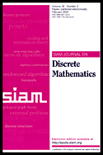
SIAM JOURNAL ON DISCRETE MATHEMATICS
Advancing the frontiers of discrete mathematics.SIAM Journal on Discrete Mathematics is a premier academic journal dedicated to the publication of high-quality research in the field of discrete mathematics. Published by SIAM Publications, this journal features original research articles covering a broad range of topics, including combinatorial optimization, graph theory, and algorithm design. With an impressive impact factor placing it in the top quartile (Q1) of mathematics journals, it is a valuable resource for researchers and practitioners looking to stay abreast of the latest advancements in discrete mathematics. Although currently not open access, the journal commits to disseminating rigorous and impactful findings that advance the understanding of mathematical concepts and their applications in various scientific domains. Renowned for its rigorous peer-review process, the SIAM Journal on Discrete Mathematics serves as an essential platform for scholars aiming to contribute to this evolving field, making it a must-read for anyone involved in mathematical research.